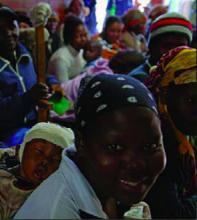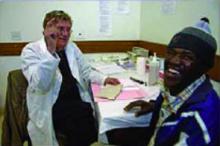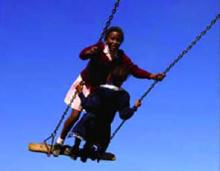User login
African Hope
Editors’ note: During 2006 we will publish coverage of hospital practices in other countries. This and the article on Iraq (p. 28) are the third and fourth articles in that effort.
At the Ontario Hospital Association’s (OHA) CEO Forum in September 2003, Stephen Lewis, the United Nations Secretary General’s Special Envoy for HIV/AIDS in Africa, challenged Ontario’s hospital leaders to take a leadership role in the fight to treat and prevent the spread of HIV/AIDS in sub-Saharan Africa. Lewis’ compelling words evoked an outpouring of interest on the part of Ontario’s healthcare and hospital community, culminating in the launch of the OHAfrica Project in 2004 by the OHA and its affiliated health research foundation, The Change Foundation.
OHAfrica supports a small team of Ontario healthcare professionals working at the first public HIV/AIDS treatment center in the southern African country of Lesotho. The Tsepong “Place of Hope” Clinic is located in the town of Leribe. The Canadian team includes two physicians, one nurse practitioner, one registered nurse, one pharmacist, and one program administrator—all working alongside a small number of local staff.
The landlocked country of Lesotho was chosen at Lewis’ recommendation. The southern African Kingdom of Lesotho was selected as the focus of the OHAfrica project. Close to 30% of all Basotho people between ages 15 and 49 are infected with HIV, and Lesotho has the fourth-highest HIV prevalence rate in the world. More than 100,000 children have been orphaned by HIV/AIDS, and approximately 29,000 people in Lesotho die of AIDS every year.
Since OHAfrica was launched on World AIDS Day in December 2004 the project has accomplished a great deal. The Tsepong Clinic has become the largest antiretroviral (ARV) treatment center in the country, and the clinic enrolls more than half of all new patients put on ARVs in Lesotho each month.
Until recently, antiretroviral drugs were beyond the means of most people in Africa, costing between $12,000 and $15,000 per year. With newly available generic drugs, the cost to provide one person in Lesotho with ARV treatment for one year is now approximately $140—less than .40 cents per day.
The ARV drugs available at the Tsepong Clinic are provided to patients free of charge, thanks to an agreement between the government of Lesotho and the Global Fund to Fight AIDS, Tuberculosis and Malaria. In 2006 children on ARVs at Tsepong will benefit from a guaranteed pediatric drug supply for the entire year, thanks to generous support from The Clinton Foundation, created by former President Bill Clinton. The Clinton Foundation was instrumental in negotiating the deal with pharmaceuticals companies to allow for the sale of generic antiretroviral drugs, which in turn allowed third-world countries access to life-saving treatment. The Clinton Foundation has a particular focus on ensuring that children get access to antiretroviral drugs and has been supportive of pediatric drug supply in Lesotho.
When the OHAfrica team arrived at Tsepong in December 2004, there were only nine patients enrolled on ARVs and 116 patients registered at the clinic. By the end of December 2005, the Tsepong Clinic had enrolled 1,151 patients on ARV treatment and 3,649 HIV-positive clients were registered at the clinic.
The impact of the OHAfrica project and the work of the Tsepong Clinic is seen in the lives of individuals, in the atmosphere of the community, and in the growing support for programs assisting people living with HIV/AIDS in the region. Patients at Tsepong have a new sense of hope and optimism for their future. Since life-saving treatment became more readily available, more people are willing to be tested for HIV, and steps are being taken to help break the stigma and fear surrounding HIV/AIDS within the surrounding community and throughout Lesotho.
The primary goal of OHAfrica is to help Lesotho build a locally sustainable HIV/AIDS treatment program. This is a big challenge in a country where the healthcare system is overburdened and there is a shortage of medical professionals. In recent months, the OHAfrica team has been working with community-based primary care clinics in outlying areas to start the process of rolling out ARV treatment at the local level.
The first year of the OHAfrica project has been marked by many challenges, and ultimately many rewards. OHAfrica has brought together healthcare stakeholders from Ontario and Lesotho to address a health issue of global urgency.
The OHA staff marvels at the impact OHAfrica has made in such a short time. “We took a leap of faith, and we are all proud and grateful that our commitment has been met, through the significant efforts of so many people,” says Hilary Short, OHA president and CEO. TH
Homer is the manager for OHAfrica, The Change Foundation & the Ontario Hospital Association.
OHA is a voluntary organization representing approximately 157 public hospital corporations across 225 sites in Ontario. Founded in 1924 as an independent, non-profit organization, the OHA is the voice of Ontario’s hospitals. For more information about OHAfrica and how you can get involved, visit www.ohafrica.ca or call (416) 205-1463
Editors’ note: During 2006 we will publish coverage of hospital practices in other countries. This and the article on Iraq (p. 28) are the third and fourth articles in that effort.
At the Ontario Hospital Association’s (OHA) CEO Forum in September 2003, Stephen Lewis, the United Nations Secretary General’s Special Envoy for HIV/AIDS in Africa, challenged Ontario’s hospital leaders to take a leadership role in the fight to treat and prevent the spread of HIV/AIDS in sub-Saharan Africa. Lewis’ compelling words evoked an outpouring of interest on the part of Ontario’s healthcare and hospital community, culminating in the launch of the OHAfrica Project in 2004 by the OHA and its affiliated health research foundation, The Change Foundation.
OHAfrica supports a small team of Ontario healthcare professionals working at the first public HIV/AIDS treatment center in the southern African country of Lesotho. The Tsepong “Place of Hope” Clinic is located in the town of Leribe. The Canadian team includes two physicians, one nurse practitioner, one registered nurse, one pharmacist, and one program administrator—all working alongside a small number of local staff.
The landlocked country of Lesotho was chosen at Lewis’ recommendation. The southern African Kingdom of Lesotho was selected as the focus of the OHAfrica project. Close to 30% of all Basotho people between ages 15 and 49 are infected with HIV, and Lesotho has the fourth-highest HIV prevalence rate in the world. More than 100,000 children have been orphaned by HIV/AIDS, and approximately 29,000 people in Lesotho die of AIDS every year.
Since OHAfrica was launched on World AIDS Day in December 2004 the project has accomplished a great deal. The Tsepong Clinic has become the largest antiretroviral (ARV) treatment center in the country, and the clinic enrolls more than half of all new patients put on ARVs in Lesotho each month.
Until recently, antiretroviral drugs were beyond the means of most people in Africa, costing between $12,000 and $15,000 per year. With newly available generic drugs, the cost to provide one person in Lesotho with ARV treatment for one year is now approximately $140—less than .40 cents per day.
The ARV drugs available at the Tsepong Clinic are provided to patients free of charge, thanks to an agreement between the government of Lesotho and the Global Fund to Fight AIDS, Tuberculosis and Malaria. In 2006 children on ARVs at Tsepong will benefit from a guaranteed pediatric drug supply for the entire year, thanks to generous support from The Clinton Foundation, created by former President Bill Clinton. The Clinton Foundation was instrumental in negotiating the deal with pharmaceuticals companies to allow for the sale of generic antiretroviral drugs, which in turn allowed third-world countries access to life-saving treatment. The Clinton Foundation has a particular focus on ensuring that children get access to antiretroviral drugs and has been supportive of pediatric drug supply in Lesotho.
When the OHAfrica team arrived at Tsepong in December 2004, there were only nine patients enrolled on ARVs and 116 patients registered at the clinic. By the end of December 2005, the Tsepong Clinic had enrolled 1,151 patients on ARV treatment and 3,649 HIV-positive clients were registered at the clinic.
The impact of the OHAfrica project and the work of the Tsepong Clinic is seen in the lives of individuals, in the atmosphere of the community, and in the growing support for programs assisting people living with HIV/AIDS in the region. Patients at Tsepong have a new sense of hope and optimism for their future. Since life-saving treatment became more readily available, more people are willing to be tested for HIV, and steps are being taken to help break the stigma and fear surrounding HIV/AIDS within the surrounding community and throughout Lesotho.
The primary goal of OHAfrica is to help Lesotho build a locally sustainable HIV/AIDS treatment program. This is a big challenge in a country where the healthcare system is overburdened and there is a shortage of medical professionals. In recent months, the OHAfrica team has been working with community-based primary care clinics in outlying areas to start the process of rolling out ARV treatment at the local level.
The first year of the OHAfrica project has been marked by many challenges, and ultimately many rewards. OHAfrica has brought together healthcare stakeholders from Ontario and Lesotho to address a health issue of global urgency.
The OHA staff marvels at the impact OHAfrica has made in such a short time. “We took a leap of faith, and we are all proud and grateful that our commitment has been met, through the significant efforts of so many people,” says Hilary Short, OHA president and CEO. TH
Homer is the manager for OHAfrica, The Change Foundation & the Ontario Hospital Association.
OHA is a voluntary organization representing approximately 157 public hospital corporations across 225 sites in Ontario. Founded in 1924 as an independent, non-profit organization, the OHA is the voice of Ontario’s hospitals. For more information about OHAfrica and how you can get involved, visit www.ohafrica.ca or call (416) 205-1463
Editors’ note: During 2006 we will publish coverage of hospital practices in other countries. This and the article on Iraq (p. 28) are the third and fourth articles in that effort.
At the Ontario Hospital Association’s (OHA) CEO Forum in September 2003, Stephen Lewis, the United Nations Secretary General’s Special Envoy for HIV/AIDS in Africa, challenged Ontario’s hospital leaders to take a leadership role in the fight to treat and prevent the spread of HIV/AIDS in sub-Saharan Africa. Lewis’ compelling words evoked an outpouring of interest on the part of Ontario’s healthcare and hospital community, culminating in the launch of the OHAfrica Project in 2004 by the OHA and its affiliated health research foundation, The Change Foundation.
OHAfrica supports a small team of Ontario healthcare professionals working at the first public HIV/AIDS treatment center in the southern African country of Lesotho. The Tsepong “Place of Hope” Clinic is located in the town of Leribe. The Canadian team includes two physicians, one nurse practitioner, one registered nurse, one pharmacist, and one program administrator—all working alongside a small number of local staff.
The landlocked country of Lesotho was chosen at Lewis’ recommendation. The southern African Kingdom of Lesotho was selected as the focus of the OHAfrica project. Close to 30% of all Basotho people between ages 15 and 49 are infected with HIV, and Lesotho has the fourth-highest HIV prevalence rate in the world. More than 100,000 children have been orphaned by HIV/AIDS, and approximately 29,000 people in Lesotho die of AIDS every year.
Since OHAfrica was launched on World AIDS Day in December 2004 the project has accomplished a great deal. The Tsepong Clinic has become the largest antiretroviral (ARV) treatment center in the country, and the clinic enrolls more than half of all new patients put on ARVs in Lesotho each month.
Until recently, antiretroviral drugs were beyond the means of most people in Africa, costing between $12,000 and $15,000 per year. With newly available generic drugs, the cost to provide one person in Lesotho with ARV treatment for one year is now approximately $140—less than .40 cents per day.
The ARV drugs available at the Tsepong Clinic are provided to patients free of charge, thanks to an agreement between the government of Lesotho and the Global Fund to Fight AIDS, Tuberculosis and Malaria. In 2006 children on ARVs at Tsepong will benefit from a guaranteed pediatric drug supply for the entire year, thanks to generous support from The Clinton Foundation, created by former President Bill Clinton. The Clinton Foundation was instrumental in negotiating the deal with pharmaceuticals companies to allow for the sale of generic antiretroviral drugs, which in turn allowed third-world countries access to life-saving treatment. The Clinton Foundation has a particular focus on ensuring that children get access to antiretroviral drugs and has been supportive of pediatric drug supply in Lesotho.
When the OHAfrica team arrived at Tsepong in December 2004, there were only nine patients enrolled on ARVs and 116 patients registered at the clinic. By the end of December 2005, the Tsepong Clinic had enrolled 1,151 patients on ARV treatment and 3,649 HIV-positive clients were registered at the clinic.
The impact of the OHAfrica project and the work of the Tsepong Clinic is seen in the lives of individuals, in the atmosphere of the community, and in the growing support for programs assisting people living with HIV/AIDS in the region. Patients at Tsepong have a new sense of hope and optimism for their future. Since life-saving treatment became more readily available, more people are willing to be tested for HIV, and steps are being taken to help break the stigma and fear surrounding HIV/AIDS within the surrounding community and throughout Lesotho.
The primary goal of OHAfrica is to help Lesotho build a locally sustainable HIV/AIDS treatment program. This is a big challenge in a country where the healthcare system is overburdened and there is a shortage of medical professionals. In recent months, the OHAfrica team has been working with community-based primary care clinics in outlying areas to start the process of rolling out ARV treatment at the local level.
The first year of the OHAfrica project has been marked by many challenges, and ultimately many rewards. OHAfrica has brought together healthcare stakeholders from Ontario and Lesotho to address a health issue of global urgency.
The OHA staff marvels at the impact OHAfrica has made in such a short time. “We took a leap of faith, and we are all proud and grateful that our commitment has been met, through the significant efforts of so many people,” says Hilary Short, OHA president and CEO. TH
Homer is the manager for OHAfrica, The Change Foundation & the Ontario Hospital Association.
OHA is a voluntary organization representing approximately 157 public hospital corporations across 225 sites in Ontario. Founded in 1924 as an independent, non-profit organization, the OHA is the voice of Ontario’s hospitals. For more information about OHAfrica and how you can get involved, visit www.ohafrica.ca or call (416) 205-1463


